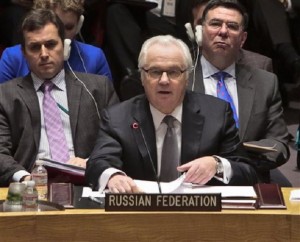US, Europeans try to rally Western front vs Russia

UN Russian Ambassador Vitaly Churkin speaks during a meeting of the U.N. Security Council, Monday, March 3, 2014 at U.N. headquarters. AP/Bebeto Matthews
WASHINGTON — The US and major allies strained on Monday to rally a strong Western front to persuade Russia to step back from a military takeover of Ukraine’s strategic Crimea region. But several acknowledged there are few options beyond already-threatened economic and diplomatic penalties, and critics said Obama administration efforts were too little, too late after years of pressing for friendlier relations with Moscow.
President Barack Obama called the Russian advance in Crimea a violation of international law. He urged Congress to approve an aid package for the Ukrainian government, and repeated earlier threats that the US would take steps to hurt Russia’s economy and isolate it diplomatically if President Vladimir Putin does not back down.
Obama met Monday evening with his national security team, including Secretary of State John Kerry and Defense Secretary Chuck Hagel, to discuss Ukraine. Hours later, Kerry was to leave for Kiev to reinforce US support for the new Ukrainian government that only weeks ago ousted its pro-Russian president.
But French Foreign Minister Laurent Fabius said Russia’s control of Crimea would not be easy to reverse. And the suggestions he offered — sending in observers from the Organization for Security and Cooperation, questioning Russia’s membership in the Group of Eight economic organization and holding out for a diplomatic dialogue proposed by Germany — were an indication of how limited the options were for the US and Europe.
Still, alternately threatening and cajoling Putin, Western leaders pointed to the damage that his nation’s natural gas, uranium and coal industries could suffer if sanctions cut off exports to the European Union, its largest customer.
Article continues after this advertisementBritain’s prime minister warned of diplomatic, political, economic “and other pressures” that could be brought against Moscow. And the European Union’s foreign ministers issued a Thursday deadline for Putin to pull back his troops or face a rejection of visa-liberalization and economic cooperation negotiations that have long been in the works.
Article continues after this advertisement“I think the situation is relatively clear, you need to see a return to barracks,” EU foreign policy chief Catherine Ashton said in Brussels, where ministers also froze preparations for the G-8 summit of major economies that is set for June in Sochi, Russia.
In Washington, Obama declared, “The strong condemnation that has proceeded from countries around the world indicates the degree to which Russia is on the wrong side of history.”
“So there are really two paths that Russia can take at this point,” Obama said. “Over time, this will be a costly proposition for Russia, and now is the time for them to consider whether they can serve their interests in a way that resorts to diplomacy as opposed to force.”
The White House said Obama met for more than two hours Monday night with the National Security Council and the other cabinet members, discussing what steps the United States can take with international partners to further isolate Russia and persuade it to de-escalate the situation.
The Defense Department announced late Monday it was suspending military-to-military engagements with Russia, including exercises, bilateral meetings, port visits and conferences. But the West stopped far short of suggesting that its own military force might be used to push Putin’s troops out of Crimea — even as Ukrainian officials reported that four Russian navy ships in Sevastopol’s harbor had blocked two vessels controlled by Kiev.
Russia, too, tried to steer the world debate.
At a UN session in Geneva, Russian Foreign Minister Sergey Lavrov said Ukraine should return to a Feb. 21 agreement that sought to end months of unrest in Kiev by addressing an array of issues at the heart of the dispute between protesters and the government of then-President Viktor Yanukovych. However, that agreement did not address the grievances that caused the protests, and the pro-Russian Yanukovych fled Kiev for protective sanctuary near Moscow within days of signing it.
“Instead of a promised national unity government,” Lavrov said, “a ‘government of the victors’ has been created.”
US officials say the Feb. 21 agreement could form the basis for a political resolution to the crisis but would have to be significantly altered.
Both Kerry and Lavrov are to attend meetings in Paris on Wednesday about refugee spillover in Lebanon from the other war on a NATO border — the three-year bloody conflict in Syria. It is likely they will discuss the crisis in Ukraine.
Obama for years tried to cultivate Russian Prime Minister Dmitry Medvedev, the former president, as a friend of the United States. Significant changes were made to Bush administration plans for a European missile defense to try to ease Russian concerns, and a new arms control treaty was signed, as part of Washington’s hopes to “reset” US-Russia relations.
“When you implement a policy of appeasement toward Moscow, that policy is going to spectacularly backfire,” said scholar Nile Gardiner of the conservative Heritage Foundation. “We’ve seen that with regards to Crimea and Ukraine.”
American Enterprise Institute security expert Gary Schmitt outlined a number of steps that he said the West should embrace to pressure Putin. Among them, he said, is the buildup of NATO forces in neighboring nations to make clear to Russia that there is a line it cannot cross in Europe. He also said Navy ships and assets should be moved to the Mediterranean Sea, and possibly the Black Sea, “to remind Russia there is a military cost for its activities.”
He noted that Russia paid little for invading Georgia in 2008.